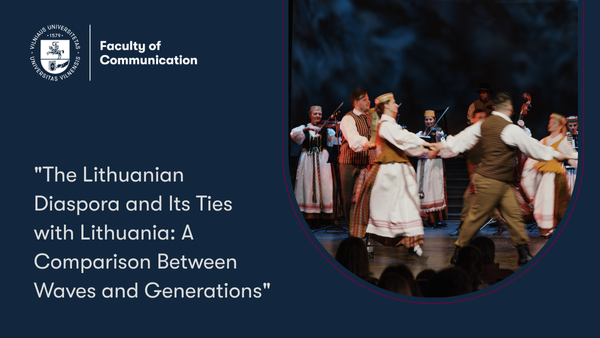The Faculty of Communication at Vilnius University, together with the Faculty of Philosophy at VU, Vytautas Magnus University and the non-profit organisation Global Lithuanian Leaders, has launched a new project titled "The Lithuanian Diaspora and Its Ties with Lithuania: A Comparison Between Waves and Generations". The Faculty of Communication is represented in the project by Assoc. Prof. Dr. Laima Nevinskaitė and junior researcher Gražina Lukšytė. The project team also includes researchers from Vytautas Magnus University and scholars of Lithuanian origin from the University of Essex (UK) and New York University (USA). The project is funded under the Lithuanian Studies 2025–2030 Programme and will run until the end of 2028.

The topic of migration is particularly relevant for Lithuania – over the more than three decades since the restoration of independence, almost half a million people have left the country, mainly for the United States and the United Kingdom. Lithuanian communities in these countries have been undergoing significant changes: an increasing number of highly educated Lithuanians are choosing to migrate, and a second generation of migrants has now grown up. These developments have reshaped the social profile of Lithuanian communities and created new opportunities for migrants to contribute to Lithuania’s economic, social, cultural, and civic life. At the same time, diaspora media have also evolved, moving into the digital sphere and relying increasingly on social networks. However, these processes have not yet been sufficiently researched. According to the project leader at Vilnius University, Assoc. Prof. Dr. Laima Nevinskaitė, the study is important not only for advancing research on the Lithuanian diaspora and its media but also for strengthening ties with Lithuanian communities abroad.
The aim of the project is to investigate the characteristics of different generations of Lithuanian migrants in the United States and the United Kingdom, their involvement in preserving Lithuanian identity, and their connections with Lithuania. The researchers will compare different waves and generations of migration and examine the role of diaspora media in shaping Lithuanian identity. The study will include interviews with Lithuanians living abroad and representatives of Lithuanian media, as well as an analysis of diaspora media content. The results will be presented in international scientific publications, conferences, and a monograph. In addition, recommendations will be developed for policymakers on how to encourage the involvement of different generations of migrants in contributing to Lithuania’s prosperity.
